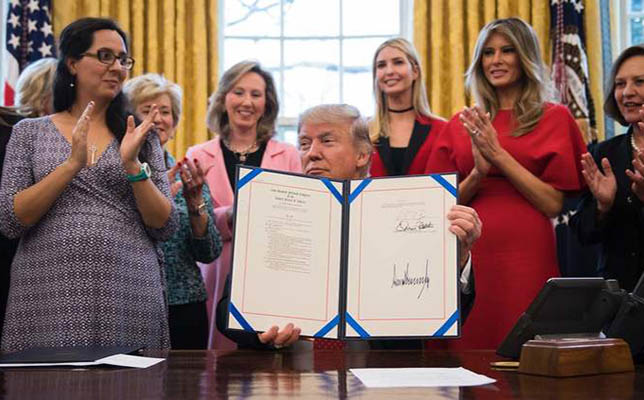Trump Signs Bills to Boost Women, Girls in STEM

Image Credit: Jim Watson, AFP, Getty Images.
Only 26 percent of women who obtain STEM (science, technology, engineering, math) degrees work in STEM jobs. New legislation coming out of the Oval Office earlier this week seeks to tackle this issue by creating new opportunities for these women, as well as girls who are interested pursuing STEM and entrepreneurial careers. President Donald Trump signed two bills Tuesday — both introduced by women in Congress — aimed at recruiting more women for STEM fields.
First, the Inspiring the Next Space Pioneers, Innovators, Researchers, and Explorers Women Act (INSPIRE Act), proposed by Congresswoman Barbara Comstock (R-VA), authorizes NASA administrators to encourage K–12 female students to participate in the aerospace field. The bill highlights a few of NASA’s existing mentorship and outreach programs as examples:
The INSPIRE Act’s objective is to report on existing activities with current and retired NASA personnel. It aims to identify how NASA could best support these astronauts, scientists, engineers and innovators to participate in outreach efforts. NASA has 90 days to present plans to engage with girls to the House’s Committee on Science, Space, and Technology and the Senate’s Committee on Commerce, Science, and Transportation.
Comstock, who is the chairwoman of the Research and Technology Subcommittee, said in a statement: “Our next generation of young women will now have greater opportunities to pursue careers in the STEM fields that are central to our 21st century economy.”
The second measure, Promoting Women in Entrepreneurship Act, authorizes the National Science Foundation (NSF) to support entrepreneurial programs for women. It was introduced by Congresswoman Elizabeth Esty (D-CN.) and gives NSF authority to expand programs that “recruit and support women to extend their focus beyond the laboratory and into the commercial world,” according to the bill.
Trump, at the televised White House signing ceremony on Feb. 28, said, “It’s not fair and it’s not even smart,” in regards to the low percentage of women with STEM degrees compared to those actually in the field. “It’s unacceptable. We have so many American women who have these degrees, but yet are not being employed in these fields. That’s going to change very rapidly.”
About the Author
Sri Ravipati is Web producer for THE Journal and Campus Technology. She can be reached at [email protected].